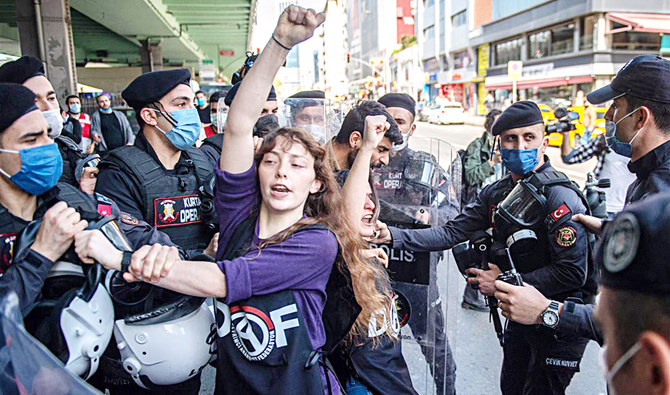ISTANBUL: Thousands of Turkish protesters have been prosecuted in recent years amid a government crackdown on right of assembly, a new report by Turkey’s Human Rights Foundation has revealed.
A total of 4,771 violations were recorded in the the four years to 2019, with Turkish prosecutors filing lawsuits against 4,907 people for taking part in public protests, the report claims.
At least 999 people were sentenced to a total of 13,370 months in prison.
Protesters faced charges of membership in a terror group, damaging public property, resisting police or insulting the president.
The report said that about 4,900 protesters had been the victims of police violence, with some losing their lives.
Violence took place mostly during protests over the Kurdish conflict or the dismissal of public officials following the 2016 failed coup attempt.
“The destruction of the democratization process in Turkey reveals deep and systematic violations against the right to assembly and demonstration,” the report noted.
Turkey’s Constitutional Court recently highlighted the case of a protester, Erdal Sarikaya, who was blinded in one eye during the 2013 anti-government Gezi Park protests. Sixteen police officers involved in the violence were not prosecuted.
In Turkey, public officials cannot face a criminal investigation without approval by the authorities.
Sarikaya sued the authorities for his injury caused by a tear gas canister fired by police.
SPEEDREAD
• The report by Turkey’s Human Rights Foundation said that about 4,900 protesters had been the victims of police violence, with some losing their lives.
• Violence took place mostly during protests over the Kurdish conflict or the dismissal of public officials following the 2016 failed coup attempt.
The court ordered the state to pay compensation to Sarikaya and ordered an investigation into the police responsible for the injury.
During the Gezi Park protests, 11 demonstrators were killed and over 8,000 people injured, while there were more than 3,000 arrests.
In April, the human rights foundation revealed that 23 students were killed and 720 injured during protests in Turkey between 2015 and 2019.
Turkish police officers violated the rights to assembly of students mostly on university campuses, the report said.
Recently, hundreds of students were arrested and dozens faced police violence during a police crackdown on the country’s prestigious Bogazici University amid protests against the politically appointed rector of the university.
Police used tear gas and rubber bullets, injuring students and also journalists.
In April, a new directive banned citizens from recording police footage during protests. All audiovisual recordings of police at protests are now deemed illegal as they allegedly violate the privacy of police forces.
Rights groups have claimed the move will undermine police accountability during demonstrations.
According to a recent Human Rights Watch report, allegations of ill-treatment, police brutality and torture have increased significantly in recent years.
A Turkish woman was detained for a day on May 19 after a street interview in which she attacked “those who eat others’ shares,” a common Turkish idiom meaning that some people are benefiting from goods that don’t belong to them.
She was detained after sharing the claims on social media.



























